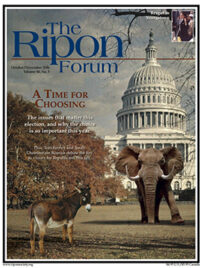
Growing up in Pennsylvania, in a blue-collar family in a blue-collar town, I learned some valuable lessons as a kid; lessons like being accountable for your actions, having respect and compassion for others, and understanding the value of hard work and character.
I carried these values with me to Washington, and they matter as much today as they did when I became chairman of the House Budget Committee in 1995.
Back then we, as Republicans, understood the significance of the opportunity we had been given, and we put forward, for ourselves and the country, a set of core principles to guide our efforts. These were common sense ideas rooted in the notion that Washington should have less power and individuals, families and communities should have more.
First, we sought to limit the size and scope of government, pruning government to keep it from growing in distorted ways. Second, we honored the fundamental American value that you shouldn’t spend more than you take in. Finally, we committed to do everything possible to keep from passing more debt on to our children and future generations.
Our leaders are too busy painting the walls to notice the cracks in the foundation of the nation’s economy.
We agreed that these core values were worth sacrificing our political futures for. Our commitment was so strong that we forced a government shutdown in 1995 to prevent another phony economic plan from being put into place.
Eventually we forged a bipartisan coalition of leaders in Congress who set aside their differences and stood for something. We balanced the first budget since man walked on the moon. We reformed the welfare system, which is still being heralded as a success. We eliminated government agencies. We limited the growth of government spending, including in entitlement programs. With the help of capital gains tax cuts and lower interest rates, we generated government budget surpluses well into the future, and ushered in an era of explosive economic growth. Our policies worked, and we were successful because those policies flowed from our common sense, limited government principles.
But times and priorities have changed. War, terrorism, gas prices and immigration have all but saturated the news, and it’s obvious that voters are frustrated with the current political environment. These issues are important, but have caused so much partisan bickering that they’ve become a distraction. I can’t help but think our leaders are too busy painting the walls to notice the cracks in the foundation of the nation’s economy.
Where is the discussion on issues of fiscal responsibility like restraining government spending, reducing bureaucracies, controlling a ballooning debt, and addressing the economic impact of the retiring baby boom generation? As these issues continue to go unchecked, their solutions become more difficult to achieve. Despite cutting tax rates in 2003, which helped the economy grow and increased revenues, Washington’s fiscal house is not in order. When I left Congress in 2001, the budget was balanced, $453 billion of debt had been paid down, and there were future surpluses of $5.6 trillion that could be used to save Social Security and Medicare. Now, however, the deficit sits at $260 billion and is projected to reach $328 billion by 2010. Yet the spending continues. Government spending is likely to increase by 7.7 percent this year, outpacing economic growth.
The simple truth is that there is a lack of political will to curtail the growth of government spending, particularly the wasteful government spending stemming from many lawmakers’ pet earmarked projects.
Government Can’t be all things to all people.
Congress and the Administration must answer the fundamental question of what should government do. Government should help people who can’t help themselves, and we need government to protect our borders, build roads, fight wars, and be there when natural disasters wreak havoc on people’s lives. But government can’t be all things to all people. Our leaders must systematically identify the things that the federal government is doing that don’t work and turn them over to the private sector. They must also identify the things the federal government is doing, but shouldn’t be, and turn those responsibilities over to the state and local governments. They must stand up to special interests, inside and outside of Washington, and be willing to make political enemies for the greater good of the country’s economic health. Finally, they must look forward to the fiscal tsunami about to overtake the budget as the baby boom generation retires, finding innovative solutions for reform in health care, Medicare, and Social Security.
Yes, many Republicans have lost their way, resigned to the idea that deficit spending isn’t all that bad and big government isn’t that big a deal. But whatever problems the Republicans have in this election year don’t compare to the complete lack of vision by the Democrats. Where is their plan? Where is their alternative? They continue to offer little in the way of solutions other than raising taxes and shrill political partisanship. My question is – where does this leave the country?
People ask me all the time if I’m disheartened and disillusioned. They want to know how I feel about having all the hard work the Budget Committee team and Republicans did back in the 1990’s washed away My answer is simple. While our work has largely been undone, the model we established still stands. The problems we faced back then are essentially the same problems we still face now. At the end of the day, our approach of standing on principle and reaching across the aisle is our lasting legacy. And I believe this approach can still work today.
John Kasich is a former Representative from Ohio and served as Chairman of the House Budget Committee. He currently hosts “The Heartland with John Kasich” on FOX News Channel. He also serves as managing director at Lehman Brothers in the Investment Banking Division.




